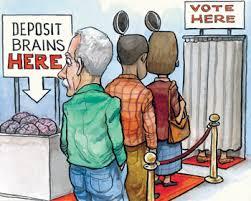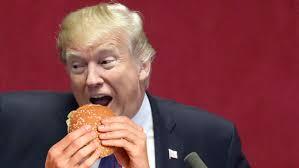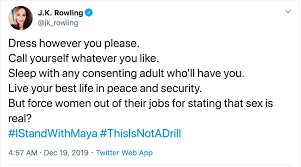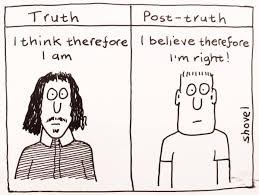Like half the country, I’ve spent four years struggling to understand how the other half could vote for Trump. It seems insane.

A piece on medium.com by Jeff Valdivia has some insight.* He mainly discusses a podcast by Sam Harris (End of Faith author). They see Trump’s unspeakableness as perversely working in his favor. For all his self-praise, one thing he actually never claims is moral virtue. Welcomed by people sick of having their own virtue impugned. At last, someone who’s not a role model they must compare themselves (unfavorably) to. Harris thinks Trump offers a kind of “spiritual balm” of comfort for them.

A good example, says Valdivia, concerns fast food, the obesity epidemic, etc., with many Americans feeling shamed by a scolding commentariat. In this, and many other regards, Trump’s own shamelessness is appealing to his supporters, giving them a kind of personal validation.
But Valdivia, again citing Harris, says Trump’s appeal is best understood vis-a-vis the far left. With their moral censoriousness and virtue shaming on steroids: “a level of sanctimony that defies all reason.” Which normal people rebel against.
I recently reviewed Robert Boyers’s book, whose title fits perfectly here: The Tyranny of Virtue. It’s aimed at academia, where the slightest deviation from the left’s catechism incurs Savonarolan retribution. But such “cancel culture” has spread to the wider society.

Just one example: transgender issues. I fully support people wanting to live as their true selves. But this too has become an all-or-nothing, scorched earth orthodoxy. As with J.K. Rowling called a transphobic monster for making some actually obvious observations distinguishing between cis and trans women. It’s a real issue in sport, where genders have competed separately due to physical differences; a trans woman would have unfair biological advantages. Meantime, we see maladjusted teenagers suddenly deciding to change sex, with lifelong consequences, but no one allowed to caution them. A scientist, Lisa Littman, who dared to study the matter, was fired. If you’re not transfanatic, you’re transphobic!
Such deranged moralistic absolutism is very antagonizing. To the extent Trump is seen as pushing back against it, he mines a rich vein of political gold.

Recall how Hillary’s “deplorables” comment backfired, Trump supporters wearing it as a badge of honor. Refusing to be looked down upon by hoity-toity snot-noses. It’s one thing to disagree about an issue; quite another to call you deplorable. Or racist, sexist, homophobic, etc. Especially racist. People’s feelings about race are often complicated. Few see themselves as “racist.”
For this judgmentalism many Republicans hate Democrats. Also because of the hard left, even though most Democrats actually reject it too. But much Republican hatred for Democrats is based on falsehoods. It’s mainly sheer tribalism — my tribe good, other tribe bad. And your tribe is a package deal. If it includes deeming climate change a hoax, or Biden’s election fraudulent, you buy the whole deal. America’s right is now enraged believing the lie that Biden won by fraud. Threatening violence.
Thus Valdivia sees crazy on one side driving crazy on the other; each continually upping the ante of our polarization. How can we break out of this? He reports on an initiative called Braver Angels, getting political opposites together to converse in a “safe space.” To elide the shouting and demonization to arrive at what co-founder Bill Doherty calls accurate disagreement. While seeing more in common than they’d realized. People being “more complicated and less evil” than we think, says Valdivia.
It isn’t rocket science; in fact, earnest initiatives like this are legion. But it requires good will and open mindedness to begin with (certainly scarce on the hard left). And what tiny percentage of the U.S. electorate would participate in such get-togethers?

A recent David Brooks column is also on point. It’s all about epistemology: how we know things. There are basic methods for that. Rejected by today’s Republican Trump cultists. This is part of the obvious growing cultural divide between urban educated people and those who see them as distant, condescending, having it easy, with different values. Causing cynicism and alienation. The “evangelists of distrust, from Trump to Alex Jones to the followers of QAnon” play into that, providing a tribal bonding. Conspiracy theories are effective emotional tools, conferring a perverse kind of power. Believers imagine themselves privy to some hidden truth. In sum, Brooks says today’s Republican identity is defined not by policies but by a paranoid mindset.**
He does believe that honest discourse, like in the Braver Angels thing, can help, narrowing the social/cultural chasm. However, he says, “you can’t argue people out of paranoia;” can’t talk them out of an emotional state. Brooks thinks a lot of it stems from economic anxiety, and we really have to make life more secure for people losing out, mainly those without college degrees. Yet, on the Newshour, he spoke of a neurosurgeon inhabiting the Trump alternate reality.
Brooks, Harris, and Valdivia do help demystify Trumpdom, from a psychological standpoint. However, as voters we really have a responsibility to see past our personal stuff and give thought to the bigger picture. And even from the perspective of raw self-regard and self-interest, does it really make sense to install so vile and feckless a president? Look at the covid disaster. Does this “make America great again?” Is it the role model you want for your children?

Or else you can blind yourself to such realities, which again is indeed a large element of Trumpism. But whatever reasons may lie behind your voting choice, it can’t possibly be a good idea to base it on flouting reality. That can only bite you in the behind.
At what point do you finally say, “Enough; this is insane?”
* Read it here: https://jeff-valdivia.medium.com/finally-an-answer-to-why-so-many-people-voted-for-trump-34106d896bec
** This partly explains polls underestimating Republican votes. They didn’t lie to pollsters; instead many wouldn’t answer at all, seeing polling firms as part of the elitist establishment they despise.
